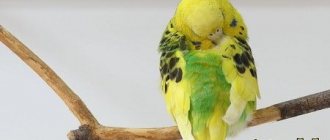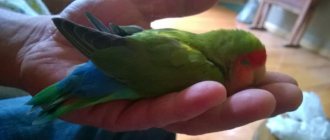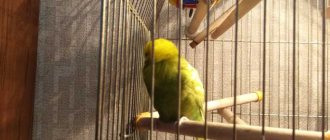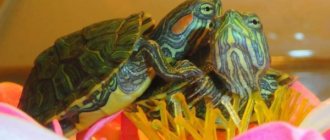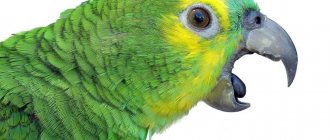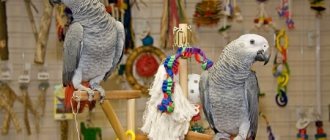Owners of budgerigars are confident that their pets will live long and carefree, delighting their owners with their trill every day. It is believed that in favorable conditions birds can live for decades. But there are always exceptions to the rules. Trouble comes unnoticed, and at one point the owner realizes that the parrot is seriously ill and will most likely die soon. What causes budgerigars, which are bred at home, to die if the birds were cared for according to all the rules? Our article provides an answer to this question.
Why do birds die at home?
In the wild, birds rarely live beyond 4 years. While at home a pet can live all 15 .
There are also centenarians who reach the 20-year mark, but this is the exception rather than the rule.
Accidents
Almost anything can happen here, from a head stuck in the bars of a cage to careless actions of the owner. Let's look at the most common causes of bird death from accidents.
Drowning
Budgerigars love water, and use its mirror surface as a play tool. But if a bird doesn't know how to swim, it can drown. Before letting your pet fly freely around the room, vases with water and aquariums should be removed from the room.
When purchasing a swimsuit, you need to take into account the size of the bird. For budgies, small containers are suitable, where the bird cannot drown even if it wants to. Whereas larger solutions, for example, for cockatoos or grays, carry danger.
Flew out onto the street
Here it is also necessary to prepare the room for flights by closing all the windows and doors . If a parrot finds itself on the street, in an unfamiliar environment, it may become confused: run into an obstacle, fall into the blades of a split system, or simply freeze from the cold.
Burn
When releasing a parrot from its cage, you should limit its flights around the kitchen, where devices and equipment dangerous to the life of the animal are concentrated. A stove, toaster, or any other heating device that is turned on can seriously injure a bird.
Other animals
If there are other pets in the house besides the bird, then it is more advisable to limit contact with them. Cats are kind and affectionate with their owners by nature as predators: it is very difficult to avoid the temptation to hunt a bird. Dogs are safe for parrots, but due to their large weight and clumsiness, they can accidentally crush the pet with their paw or body.
Small children
Children love animals and, when showing their feelings, they can inadvertently harm a fragile bird by squeezing it tightly or feeding it food that is harmful to the bird. Games with a parrot should be supervised by parents. If the child is of kindergarten age, then contacts should be limited to placing the bird on the palm.
As soon as a pet appears in the house, children should immediately be explained that it is not a toy, but a family member, and should be treated accordingly. It is necessary to teach the child to ask permission to open the cage and other contact actions.
Other reasons
In addition to the above, other factors can pose a danger to your pet, for example, water in its drinking bowl or potted plants!
It is important to remember to also keep in mind the temperature of the parrot.
Water
Always monitor the purity and quality of the water. If the parrot does not drink for more than two days, it will die from dehydration; the wavy has a fast metabolism, which means that any ailment can instantly develop into a big problem, which without surgical intervention will end in death.
Do not forget to check the serviceability of the drinker; cases when the hole through which water enters is blocked are far from uncommon.
Plants
We are not always aware that plants in our home can be poisonous, so before letting your bird go for a walk, it is worth removing all the pots. This will help protect the plants themselves from the parrot, who will not disdain to ruffle the leaves for his pleasure.
A cactus, for example, can leave its needles in an active parrot after close contact, causing the wounds to become inflamed and cause serious discomfort to the bird.
Diseases
We are talking about diseases that could have been avoided with due attention to safety. One of the common mistakes made by the owner of a parrot is to move a new tenant in with the old ones, without quarantine.
Even if a new parrot is taken from friends or from a trusted pet store, it must be kept in a separate cage for a month, where you can observe the behavior, appetite, droppings and activity of the bird.
Do not kiss your parrot under any circumstances; your saliva can carry many pathogenic bacteria and fungi that will ultimately kill the bird. Also try to avoid contact with other parrots, we are talking about exhibitions.
Of course, every wavy owner wants to show off his pet, but you should think twice before taking part in an event where the infection can spread through the air.
A sick bird does not always differ in appearance from its healthy comrades; sometimes it acts as a carrier.
Overheat
Budgerigars are not able to tolerate heat; when the temperature rises, they will always strive to get into the shade, swim and quench their thirst. But when there is no way to hide from the sun, the wavy begins to develop hyperthermia, shortness of breath appears, and the body rapidly loses water.
Every budgerigar owner dreams of his feathered pet living a long and carefree life. As you know, these birds live for about 4-6 years, but in captivity they can easily live up to 12-16 years. But danger can lurk everywhere for a little parrot. If you do not secure the space where the bird lives and do not monitor its health, then premature death will occur.
Diseases
The list of possible diseases in budgies is quite impressive. But if you carry out regular prevention and follow simple recommendations from specialists, then health problems can be minimized.
Has your parrot been sick?
Not really
Poor nutrition and poisoning
Many newcomers to this business make the same mistakes. The first is overfeeding. Owners think that their pet's chirping is a desire to eat. As a result, the bird develops obesity, which can be fatal in severe cases.
The pet should be fed rationed. It is better to underfeed a little than to overfeed. The main thing is that the bird always has access to water. Treating obesity is difficult and time-consuming.
Parrots should not be given certain fruits and vegetables, such as watermelons, persimmons, papaya and potatoes. Canned food and herbs are also prohibited. In addition to food, toxic substances can kill your pet. Among them are nicotine, certain herbs, rotting products and chemicals: detergents, medicinal, insecticidal and others.
Injuries
Even if a parrot lives alone in a cage, it is not immune from injury. Particularly active birds can be injured by toys, perches and rods. When a bird flies freely around the room, it is necessary to monitor its movements: stop dangerous games with interior items, and also try to close all the cracks where the parrot can get into.
Parasites as a cause of death
Infestations of ticks and worms can be fatal if left untreated. You must monitor your pet's condition every day and respond appropriately to any changes. At the first signs of invasion, it is more advisable to consult a specialist rather than self-medicate.
Frequent laying
Breeders are guilty of this factor. In pursuit of the number of young, they contribute to an increase in clutches, while the female must rest after hatching the chicks for at least 2 months. If the bird’s body does not recover, it may die during the next laying.
Other diseases
Here we have viral and bacterial infections, tumors of various types, pathologies of internal and external organs. Not all diseases can be diagnosed by external examination , and not all owners can afford to visit a veterinary clinic. As a result, pets die from chronic diseases.
If your budgie is shaking
Trembling in itself is not considered dangerous to the health of the parrot, and it can be caused by disturbances in feeding or inappropriate living conditions. By correcting the shortcomings, you can easily improve the situation.
But if the trembling of the wings and tail does not go away, and the measures taken by the owner do not give the desired result, then this indicates the onset of the disease. A sick bird is shaking, its feathers are ruffled, the pet often sleeps for a long time, leaning its belly on the perch. At the same time, it does not react to extraneous sounds, does not make contact, and does not clean its feathers. Symptoms of the disease are:
- Lack of appetite. Complete refusal of food, drink and treats.
- Self-plucking. A large number of feathers with traces of blood is a very alarming sign.
- Constant scratching. Possible parasite infection.
- Difficulty breathing with the appearance of shortness of breath.
- Change in consistency and color of droppings.
- Refusal to walk around the room.
- Trauma, broken limb, open wound.
- Oral burns from feeding too hot food.
- Poisoning.
- Uncharacteristic scream.
- Loss of coordination in space.
- Purulent discharge from the cere.
If any of the symptoms are detected, you should not treat yourself. It is necessary to visit a veterinarian for diagnosis and treatment. Delay often threatens the death of your pet.
Emotional problems
Many do not take this factor into account, whereas it is psychological problems that open the door to other, more dangerous diseases. When a bird experiences constant stress, it significantly shortens its life.
Yearning
In stores, parrots are kept in groups and they never get bored. But when the pet is left alone, and the owner does not pay enough attention to it, the bird falls into apathy. As a result, the immune system is undermined, weakness appears, and the bird fades away literally before our eyes.
Buying a pet is a responsibility. He shouldn't be left alone for long. Rare visits during feeding are not enough to normalize the emotional state of the bird.
Fear and severe stress
When a parrot is constantly under severe stress, it begins to beat around the cage or, on the contrary, hides in a corner, plucking its feathers. A pet’s heart may not be able to withstand severe fright, so it should be protected from sharp sounds, for example, a washing machine, TV, or loud human screams.
Food poisoning
Remove anything from the parrot's access area that could poison it. Budgerigars are curious and love to taste their surroundings. Any chemicals, electrical wires, and some types of house plants should be excluded.
Many breeders, when interacting with a budgie, let it close to their face. However, it is better not to do this. Some bacteria that cause diseases in humans are also dangerous for birds.
Do not cover the cage tray with newspapers. Change the water in the drinking bowl regularly and prevent mucus from forming in it. If you suspect poisoning, add activated charcoal to your parrot's food.
It is best to keep birds out of the kitchen, especially while cooking. Open fire, boiling water - all this can easily lead to tragedy. To avoid this, designate one specific room for your pet to walk around.
Other factors
The lifespan of a budgerigar can be influenced by a number of other factors independent of the pet itself. First of all, these are genetics and the conditions of keeping the bird.
Place of purchase
Sellers at poultry markets are not always honest with buyers and may slip old birds. In addition, only a specialist can determine the exact age of a bird after a year. The same applies to hidden diseases, so it is better to buy a pet in trusted pet stores.
Genetics
Through the process of crossing, breeders try to produce remarkable individuals. But sometimes the results of their work manifest themselves in diseases inherent at the genetic level. It is very difficult to recognize such an individual. When buying a pet, experts recommend sticking to classic shapes and colors.
Bird living conditions
If the owner cleans the cage from time to time and uses mediocre products as food, then the bird will not last long in such conditions. She faces problems with the gastrointestinal tract, infections and parasites. All this shortens the life of the parrot.
Floor
It has been noticed that male birds at home live longer than females due to the double sex chromosome. While in the wild the opposite is true. Competition for mates and territory is a consequence of the death of many males.
Why do parrots die?
Injuries
Parrots released from a cage often drown in water, hit glass (mirror), get burns, and die from electric shock. They may be slammed by a door or trapped in a drawer. It happens that the owners, lost on their feet, are looking for their pet, and somewhere behind the closet lies a dead parrot. Defenseless birds are attacked by cats and dogs, and children literally strangle them in a fit of tenderness. When birds become entangled in curtains, they break their legs and beaks—whatever happens to them.
A person is not always the cause of the circumstances in which a parrot dies. There are birds that are leaders by nature, and there are birds that are cowardly and downtrodden. Cocky individuals attack weaker opponents, pecking them to death. In young females, the first clutch does not always go well: the egg may get stuck in the oviduct, and the female dies due to compression of the organs.
Diseases
A rapidly progressing process without treatment is what parrots die from most often. these are cancerous tumors, viral infections, feather damage. Endocrine and cardiovascular diseases occur in parrots no less frequently than in humans. Among veterinarians, highly specialized ornithologists are a profession in short supply, so diagnostics are not up to par. Without waiting for help, exotic birds die even in the most severe cases.
Poisoning
The frivolity of the owners and the curiosity of the feathered pet lead to dire consequences - the parrot dies from poisoning.
What substances can turn a cheerful parrot into a veterinarian's patient?
- poisonous plants (ficus, dieffenbachia, fern, spurge);
- wallpaper and furniture glue, polyurethane foam;
- chemical cleaning products;
- Teflon pairs (frying pan, iron, hair dryer);
- domestic gas;
- Oil paint;
- aerosols.
Having inhaled toxic fumes or swallowed poison, the bird receives a chemical burn to the esophagus. Poor quality food contains hidden fungi that cause acute poisoning, from which fragile parrots quickly die.
Attention!
Food from cardboard boxes, where most of the composition is oats, sometimes contains ergot, a fungus that is dangerous for small birds. Vacuum-packed mixtures are preferable.
Stress
Even a seemingly healthy bird can die unexpectedly. A significant percentage of mortality in parrots is occupied by cases associated with their emotional sensitivity. A weak heart cannot withstand stress caused by fear, moving or deep sadness. Owners sometimes face the following situation: they bought and brought home a parrot, but it died - it could not stand the change of environment. Lonely birds, not spoiled by the attention of the owner, are also at risk. Plunging into melancholy, the birds cannot occupy themselves, stop eating, pluck their feathers and gradually fade away.
Poor living conditions
Living in inappropriate conditions, as well as lack of proper care, leads to the fact that the parrot gets sick and subsequently dies. A cage forgotten in the sun, an open window in winter, clutter and dirt are a sure way to frequent illnesses and weakened immunity. Poor quality food also plays a role: it disrupts digestion, and decay products accumulate in the body. A lethargic mood, an open beak, rolled eyes, a swollen crop are just some of the signs that a parrot is dying.
Heredity
There are hidden diseases received by the chick from its parents. At first glance, everything is fine with the bird, but somewhere inside there is a developmental defect hidden. Genetic predisposition is why parrots still die in their prime. The most expensive food, careful care and friendly company will not save a bird from death.
How to understand the approaching death of a bird
A number of signs indicate an imminent death. The death throes can last from one hour to several days, depending on the condition of the pet and the severity of the disease.
Signs of a bird's impending death:
disorientation;- frequent vomiting;
- throwing the head to the side;
- convulsions;
- motionless legs;
- whitish film on the eyes.
At the first sign of impending death, you should immediately contact a veterinarian. It is quite possible that the pet can be saved.
First actions
So, you have determined that your budgie is dying, what should you do? Provided that if the owner soberly assesses his capabilities and knows the symptoms of a particular situation, the first aid actions will be:
- Against vomiting and diarrhea. Soldering with liquid glucose and saline solution, 1 ml every 10 minutes.
- From a chemical burn. Solcoseryl eye gel is administered orally. They also treat the eyes and wax.
- For shock and shortness of breath. An intramuscular injection of glucocorticoid drugs is performed.
- For broken limbs. Immediate fixation is required.
- Hypothermia. You need to warm up your pet.
- In case of poisoning by toxic fumes. The cage with the parrots is moved to another room, the room is ventilated.
- In case of poisoning from a houseplant. Seal off with sorbents every hour.
If the owner is not confident in his actions, or does not know the cause of the disease, the first action will be to contact a specialist. Only in this case can the bird be saved.
What to do if the wavy dies
Good grief, but you can’t leave a dead pet at home. He needs to be buried. The fact is that birds are carriers of dangerous diseases, so it is more advisable to carry out the burial procedure no later than the next day after death.
How to bury a bird correctly
Animals cannot be buried within the city limits . You'll have to look for a place in the nearest forest belt. The parrot's body is wrapped in a piece of cloth and buried about half a meter into the ground. To prevent animals from digging up the grave, you need to lay stones or turf on top.
What to do with the cage
You cannot add other birds to the cage where your pet died without first treating it. General cleaning with complete disinfection is required. Products for the latter can be purchased both in pet stores and pharmacies, describing the nature of the problem.
How to save a pet or alleviate its condition
The main thing for the bird owner is to notice changes in the pet’s behavior in time. Before death, the parrot behaves in such a way that it is difficult not to notice. At the first unfavorable symptoms, the bird should be immediately shown to a specialist.
Due to the fact that there are few highly specialized veterinarians, the owner himself needs to become familiar with what diseases and dangers may lie in wait for the parrot.
It is advisable to write down the numbers of veterinary pharmacies and veterinarians, from whom you can consult and purchase the necessary medications.
At home, you should have antiseptics, cotton pads, fine-tipped tweezers, and other drugs and products that may be useful if the bird gets injured.
It is not easy to predict what medications you may need. Only a doctor will decide this. You should also know that you don’t need to disturb a sick pet so that it doesn’t die, but call a specialist home. The bird needs to be provided with peace and comfortable warmth until the doctor arrives.
Another situation is if the pet breaks its leg. She needs to be bandaged tightly and taken in a carrier to the veterinary clinic. The veterinarian will decide what to do with the sick bird.
